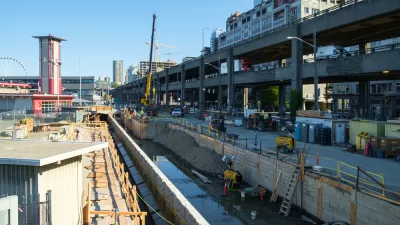When it comes to infrastructure projects, “we're not just a bit behind the curve — we're ridiculously, embarrassingly behind the curve,” according to a recent article by Ryan Cooper.

Ryan Cooper asks a simple question without a simple answer: “Spain, a developed market democracy, gets 10 to 20 times as much infrastructure for its money as America does, and it is of much higher quality to boot. Why is this?”
The question of infrastructure spending seems particularly pertinent of late—given all the recent research showing new behaviors in transportation and the environmental threats created by climate change (which are uniquely challenging in New York City or California and everywhere else, for that matter).
Cooper mentions three possibilities—expensive labor, out-of-control private contractors, and a “crap procurement process”—as culprits for the state of infrastructure investment in the country, but also acknowledges “it would be a mistake to focus too much on particular techniques or failures. The reality is that when it comes to cost and quality, America is doing basically everything wrong.”
FULL STORY: Why is it so expensive to build a bridge in America?

Planetizen Federal Action Tracker
A weekly monitor of how Trump’s orders and actions are impacting planners and planning in America.

Map: Where Senate Republicans Want to Sell Your Public Lands
For public land advocates, the Senate Republicans’ proposal to sell millions of acres of public land in the West is “the biggest fight of their careers.”

Restaurant Patios Were a Pandemic Win — Why Were They so Hard to Keep?
Social distancing requirements and changes in travel patterns prompted cities to pilot new uses for street and sidewalk space. Then it got complicated.

Platform Pilsner: Vancouver Transit Agency Releases... a Beer?
TransLink will receive a portion of every sale of the four-pack.

Toronto Weighs Cheaper Transit, Parking Hikes for Major Events
Special event rates would take effect during large festivals, sports games and concerts to ‘discourage driving, manage congestion and free up space for transit.”

Berlin to Consider Car-Free Zone Larger Than Manhattan
The area bound by the 22-mile Ringbahn would still allow 12 uses of a private automobile per year per person, and several other exemptions.
Urban Design for Planners 1: Software Tools
This six-course series explores essential urban design concepts using open source software and equips planners with the tools they need to participate fully in the urban design process.
Planning for Universal Design
Learn the tools for implementing Universal Design in planning regulations.
Heyer Gruel & Associates PA
JM Goldson LLC
Custer County Colorado
City of Camden Redevelopment Agency
City of Astoria
Transportation Research & Education Center (TREC) at Portland State University
Camden Redevelopment Agency
City of Claremont
Municipality of Princeton (NJ)





























